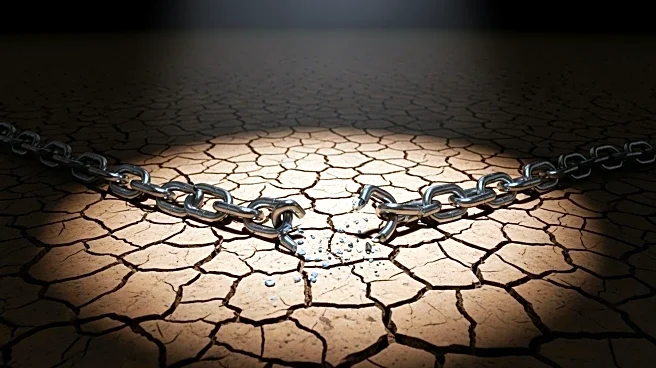What is the story about?
What's Happening?
Hamas has issued a warning that the lives of hostages could be at risk due to Israel's planned military operation in Gaza City. Abu Obaida, the spokesman for Hamas' military wing, stated that the Israeli government and military would be responsible for any harm to hostages during the strikes. He emphasized that any hostages killed would be identified by name and photo, and suggested that Israel intends to reduce the number of living hostages while concealing the bodies of the deceased. This statement follows the return of remains of two deceased hostages to Israel, including Ilan Weiss from Kibbutz Be'eri. Meanwhile, Israel is preparing for a Gaza operation that involves expanding humanitarian aid and planning for the mass evacuation of Gaza City residents to southern Gaza. The IDF is establishing additional distribution sites for food and aid, with five centers expected to serve hundreds of thousands of residents. Major-General Ghassan Alian assured residents that evacuation is inevitable and that families moving south will receive maximum humanitarian assistance.
Why It's Important?
The situation in Gaza is critical, with humanitarian aid and the safety of hostages at the forefront. The Israeli military's actions could have significant implications for the region's stability and the lives of civilians. The expansion of humanitarian aid and evacuation plans indicate a strategic approach to mitigate civilian casualties, but the threat to hostages remains a pressing concern. The international community is closely monitoring the developments, as the humanitarian crisis in Gaza continues to worsen. The IDF's efforts to ensure aid reaches residents rather than Hamas are crucial in addressing the hunger crisis, which has been described by the UN as a 'hunger pandemic.' The potential for further abductions and the high alert status of Hamas terrorists add to the complexity of the situation, impacting regional security and diplomatic relations.
What's Next?
Israel's military operation in Gaza is expected to proceed, with continued efforts to expand humanitarian aid and facilitate the evacuation of residents. The IDF is preparing additional zones to accommodate evacuees, and the military's Arabic-language spokesman has urged residents to disregard false rumors about space availability in southern Gaza. The international community may increase pressure on Israel to ensure the safety of hostages and address the humanitarian crisis. The situation remains fluid, with potential for further escalation if hostages are harmed or if Hamas carries out additional abductions. Diplomatic efforts may be necessary to de-escalate tensions and find a resolution to the ongoing conflict.
Beyond the Headlines
The ethical implications of the military operation in Gaza are significant, as the safety of hostages and civilians must be balanced with military objectives. The humanitarian crisis highlights the need for effective aid distribution and the challenges of ensuring aid reaches those in need without empowering militant groups. The cultural and historical context of the conflict adds layers of complexity, influencing public perception and international response. Long-term shifts in regional dynamics could result from the operation, affecting peace efforts and the geopolitical landscape.

















